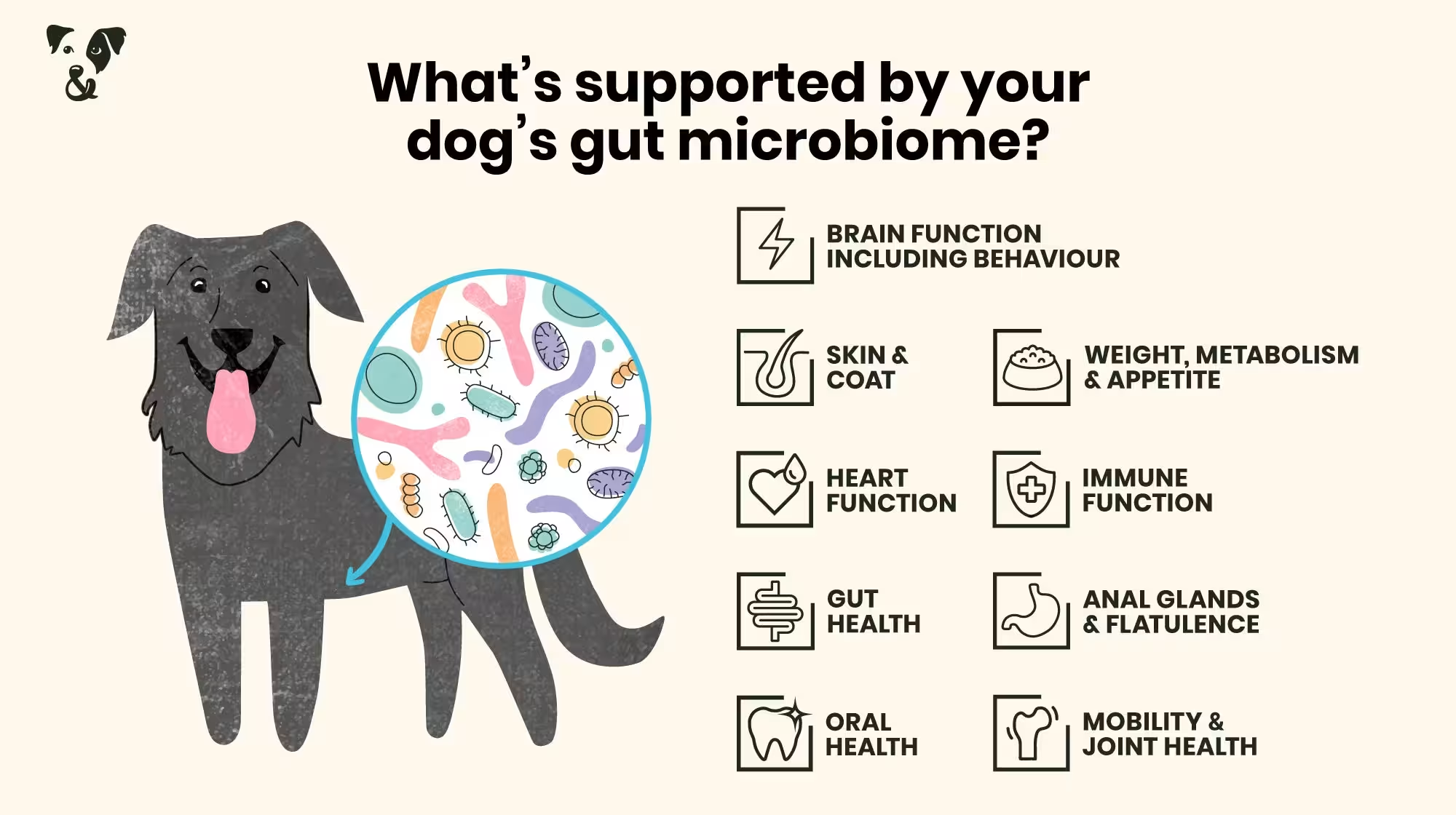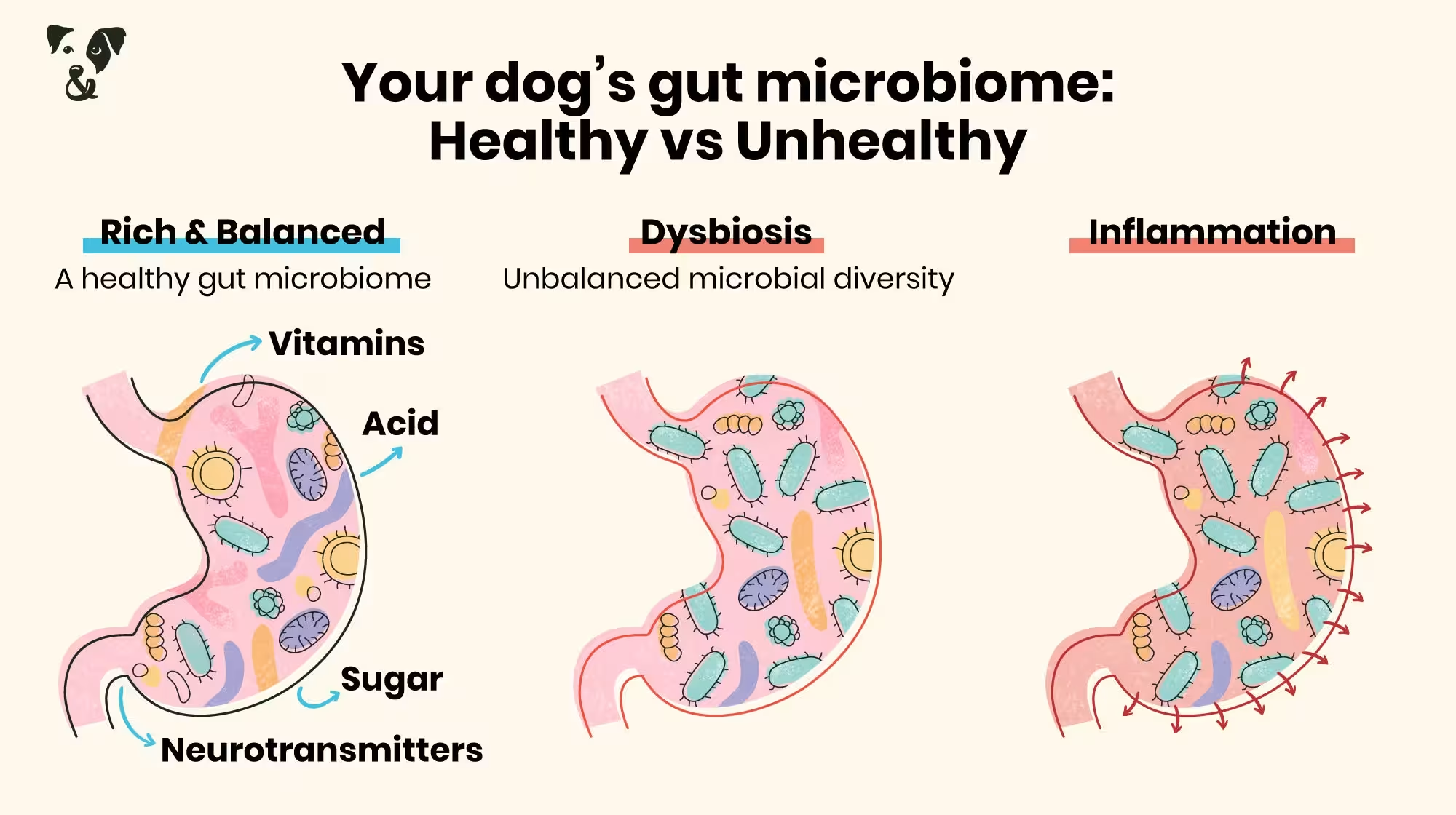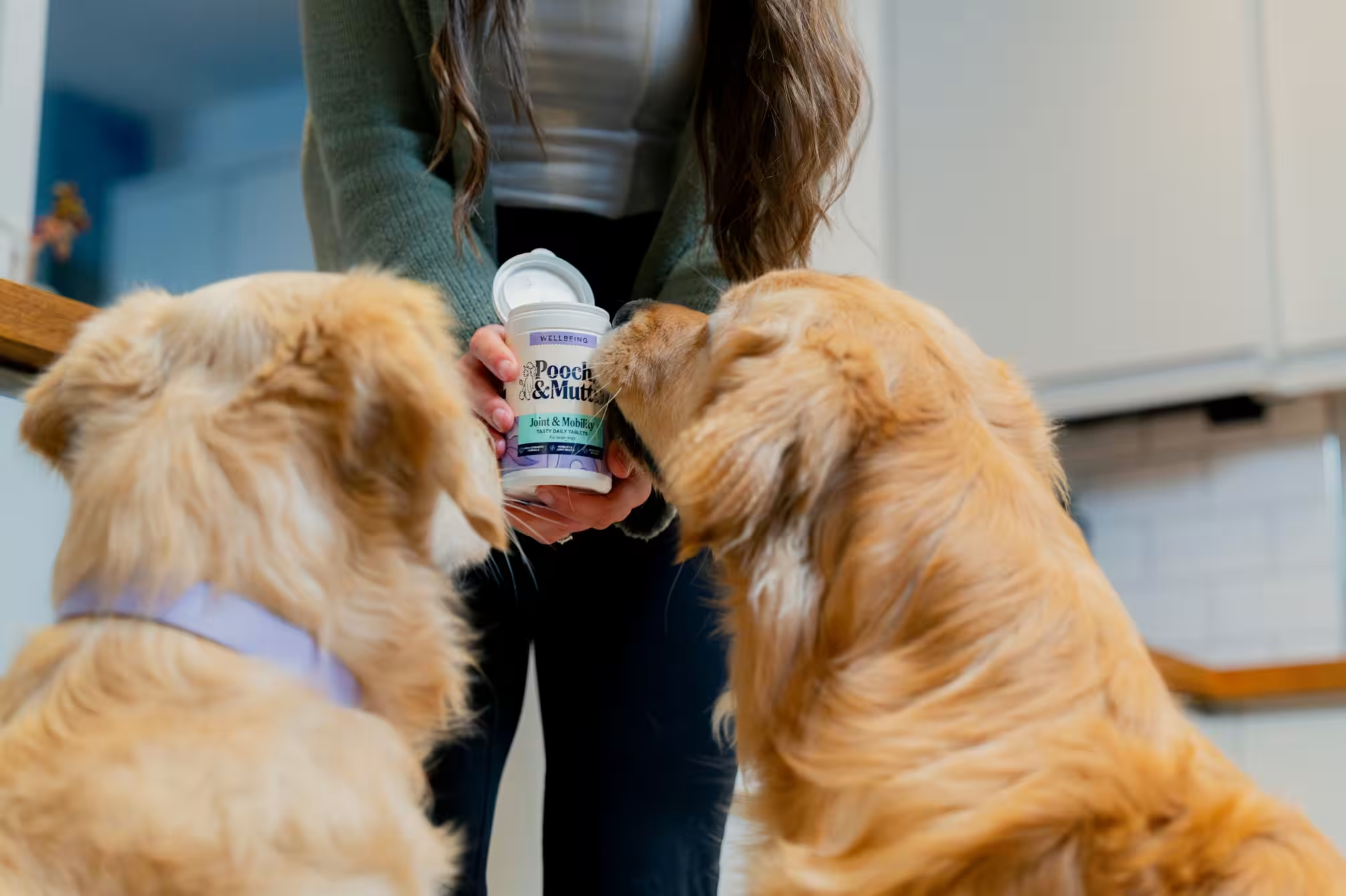Key Takeaways:
- When dysbiosis, or an unbalanced gut microbiome, is left untreated, it can cause inflammation and what is known as ‘leaky gut syndrome’. This inflammation can spread to the joints, muscles and tendons, and worsen existing joint conditions like arthritis. - Rheumatoid arthritis, in particular, is a common joint condition that is directly linked to dysbiosis and inflammation.
- The best way to rule out dysbiosis is with a Gut Health Test for dogs.
Joint issues aren’t always reserved for senior dogs, and can be a common ailment that impacts them at any age, stopping them from running, jumping, walking and living life to the fullest.
Joint issues in dogs can develop for multiple reasons, but did you know that their gut health and their gut microbiome can be one of them?
Read on to find out how your dog’s joint health is linked to their gut and microbiome, and what you can do to help them feel back on track and prevent worsened symptoms.
What is the gut microbiome?
Within your dog’s gut, you’ll find a little ecosystem of bacteria referred to as the gut microbiome.
In a healthy microbiome, the bacteria vary in species, but are in equal proportion to each other.

Each species and genus group help support and contribute to the function of many crucial processes in your dog’s body. These include, but aren’t limited to:
Digestion
Immunity
Overall gut health
Skin and coat health
And of course, their joint health.
To find out more about your dog’s gut microbiome and its role in their overall health and wellbeing, be sure to explore our other articles, including ‘Your dog’s gut health: What is a microbiome?’
 Gut Health
Gut Health
How is your dog’s gut microbiome linked to joint issues?
When your dog’s gut microbiome is healthy, it can function like a well-oiled machine, supporting bodily functions and the overall health of your dog.
A healthy gut microbiome is one where the bacteria or microbiota are rich and balanced, meaning not one particular bacteria is outgrowing the others, and there’s a healthy amount of all the necessary genus groups.

However, when there’s an unequal balance, this causes a halt in the smooth functioning of all these bodily processes. Dogs suffering from this are known as having dysbiosis, and this can lead to a number of detrimental symptoms.
When dysbiosis sets in and is left untreated, it can cause inflammation and what is known as ‘leaky gut syndrome’. This is when harmful bacteria and other toxins leak through a now weakened gut wall, and travel around the rest of the body, spreading inflammation.
This inflammation can spread to the joints, muscles and tendons, and worsen existing joint conditions like arthritis . Rheumatoid arthritis, in particular, is a common joint condition that is directly linked to dysbiosis and inflammation.
If we took a microscope to a healthy dog’s gut microbiome, you’d find equal proportions of Phascolarctobacterium, Faecalibacterium and Megamonas, which actively work towards supporting their joint health, amongst other areas. These genus groups in particular are crucial for senior dogs, who are more likely to suffer from joint issues.
How do you know if dysbiosis is contributing to your dog’s joint issues?
The only way to rule out dysbiosis is through a Gut Health Test .
With a Pooch & Mutt Gut Health Test , we gain a representative outlook of the bacteria within your dog’s gut by analysing a sample of their poop. From this, alongside information about their age, breed, weight, medical history and lifestyle, we can provide a completely tailored diet and supplement plan that’s backed by science - helping you to truly target their problem areas.


Gut Health Test
Get your results in 4 weeks, with our quick and easy, at-home Gut Health Test for dogs. One simple poo sample, analysed by our microbiologists, and you’ll get personalised recommendations to help your dog thrive.
*This item is excluded from all discount codes.
-
Science backed gut health insights
-
Online report including key health indicators
-
81% saw an improvement in their dog's health
Current price: £69.99
Gut Health Test
Signs and symptoms of joint issues in dogs
Joint issues can be difficult to diagnose without expert help. However, dogs suffering from joint pain often display certain signs and symptoms that can indicate to you that further investigation is needed.
Signs and symptoms of joint issues in dogs can include:
Limping
Mood changes
Licking the area that hurts
Reduced movement
Whimpering when doing strenuous activity
A reluctance to climb stairs or jump on/off the sofa
Stopping during walks
If you fear your dog is suffering from joint issues, be sure to check in with your vet.
Other causes of joint issues in dogs
Whilst dysbiosis can be a main contributor, there are other factors that can lead to joint issues in dogs. By ruling out dysbiosis, you can better navigate your investigation and target their treatment.
Other causes of joint issues in dogs include:
Obesity. Your dog being overweight can cause strain on their joints.
Breed & Genetics. Some dog breeds are more susceptible to joint issues than others.
Injury. Dogs are energetic creatures! Amongst jumping off the bed or running around fields, they may have caused some damage to their joints or ligaments.
Cancer & Tumours. Tumours can put pressure on the joints, causing pain. If your dog is showing signs of pain in their joints, alongside other worrying symptoms, be sure to consult your vet.

How to help your dog with joint issues
If a Gut Health Test has highlighted dysbiosis as the main root cause of your dog’s joint issues, then Gut Health Supplements, alongside changes in diet, can help alleviate problems.
That said, there are other ways you can help treat their joint issues , especially if they’re suffering from more severe joint pain. These include:
Hydrotherapy & Massage treatment. If your dog is particularly suffering from joint pain due to illness or age, your vet may recommend hydrotherapy or massage treatments. Hydrotherapy is water therapy, which is a less intrusive way of exercising dogs that puts less pressure on their joints.
Massage therapy is where your dog's joints and muscles are gently massaged to relieve pain and pressure. If you’re interested in exploring these methods for your dog, be sure to consult your vet.
Gentle exercise. When your dog is experiencing joint issues, you should reduce the amount of exercise that they do. However, some gentle exercise will prevent their joints from getting stiff. Be sure to consult your vet before doing any exercise with your dog with joint issues. When your dog is experiencing joint issues, you should reduce the amount of exercise that they do. However, some gentle exercise will prevent their joints from getting stiff. Be sure to consult your vet before doing any exercise with your dog with joint issues.
Weight management. If your dog is suffering from joint issues and they’re overweight, include weight management in their treatment. Dogs who are overweight or obese have extra pressure on the joints, which will worsen symptoms.
Adapting their lifestyle and environment. This might look like reducing the length of their walks, being mindful of where you’re taking them and investing in a dog stroller, dog carrier, stairs, or slopes around the house to relieve pressure on their joints.
Conducting a Gut Health Test for your dog with joint issues could be the first step in their treatment and potentially their recovery journey.
Explore more about Pooch & Mutt’s Gut Health Test and Gut Health Supplements , or reach out to our expert team for further advice.


















